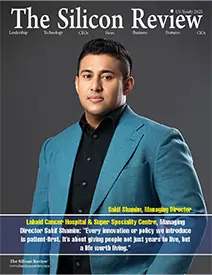>>
Technology>>
Software>>
HIPAA-Compliant CRM Software: ...HIPAA-Compliant CRM Software: Key Benefits for Medical Practices
The Silicon Review
24 September, 2024
In today's age, where everything moves quickly and efficiently, online healthcare facilities need to optimize their processes and stay in line with industry rules to thrive. The Health Insurance Portability and Accountability Act (HIPAA), for instance, lays down rules to protect patients’ health data. Integrating a Customer Relationship Management (CRM) system that complies with requirements offers advantages such as smooth communication, enhanced data security, and better patient care.
1. Streamlined Communication and Collaboration
Effective communication plays a role in delivering top-notch healthcare services in today's world of medicine and patient care. Utilizing HIPAA-compliant CRM software serves as a centralized space where team members can conveniently retrieve patient data and communicate securely among themselves. By leveraging messaging features within the CRM system itself, medical experts can work together on personalized patient care strategies, share information, schedule appointments efficiently, and exchange confidential files in a secure manner.
2. Enhanced Data Security
It is crucial to safeguard patients' confidential health information to uphold trust and adhere to guidelines effectively. To achieve this goal and maintain compliance with regulations such as HIPAA, healthcare facilities use CRM systems that meet the standards. This helps in ensuring that all protected health information (PHI) stays secure at all times. These systems employ encryption methods to protect data while it is being transferred and when it is stored. Additionally, access controls are put in place based on job roles within the organization to restrict individuals from accessing data.
3. Efficient Patient Management
Handling an expanding group of patients can pose difficulties without an established system to arrange appointments and monitor patient advancements efficiently. CRM software that complies with HIPAA regulations streamlines these responsibilities by overseeing information and recording essential data at every visit. It automates reminders for appointment scheduling and directs inquiries promptly to the departments. This approach not only boosts efficiency but also elevates patient contentment by minimizing wait times and guaranteeing timely care delivery.
4. Integrated Marketing Tools
Engaging effectively with patients to provide them with health details and promote services while building lasting connections is crucial for any healthcare facility or practice. CRM software that adheres to HIPAA regulations typically comes equipped with built-in marketing features that enable practitioners to develop customized and focused campaigns. By categorizing lists according to factors like age or location and specific health conditions, if needed, healthcare professionals can customize their communication efforts accordingly.
5. Regulatory Compliance
In today's regulated healthcare environment, it's crucial to follow guidelines diligently. HIPAA-compliant CRM software helps healthcare providers adhere to these rules by offering tools like audit trails and backups. These features track system changes and ensure data recovery in case of tech problems or emergencies.
6. Improved Telehealth Capabilities
In the digital landscape, there has been an increase in the use of telehealth services within different medical fields because of the convenience and accessibility they offer to patients and healthcare professionals alike. By implementing HIPAA CRM software that can smoothly connect with telehealth platforms, medical practitioners can conduct video consultations while upholding the strict privacy standards set by HIPAA. These features enhance the capability of healthcare providers to deliver virtual care alternatives without jeopardizing the security of patients’ data.
7. Effective Appointment Scheduling and Reminders
Effective appointment scheduling is crucial for enhancing the flow of patients and minimizing no-shows while also optimizing resource distribution in a setting. Compliant customer relationship management (CRM) software solutions come equipped with advanced appointment scheduling capabilities that easily sync with electronic health record (EHR) systems to facilitate seamless coordination among different departments.
8. Improved Patient Engagement and Follow-up Care
Building and nurturing lasting connections with patients is vital for any healthcare facility aiming for trust and loyalty among its clientele. By utilizing CRM software that complies with regulations, healthcare professionals can effectively interact with patients by sending tailored follow-up messages tailored to their health needs or treatment regimens. Taking this stance in engagement guarantees that individuals sense a genuine level of concern and assistance during their healthcare experience, resulting in enhanced adherence to treatment plans, better overall health results, and heightened satisfaction levels among patients.
In summary
Switching to a HIPAA CRM software system brings healthcare facilities advantages beyond standard customer relationship management tools. Communication features in place through this software solution foster teamwork among team members, which leads to quicker decision-making processes and ensures data security. Patient management tools help streamline workflows, optimize resource distribution, cut down on wait times, and elevate the quality of care received by patients.
 (1)_2025-10-21_13-35-14.webp)


_2025-10-02_10-21-48.webp)


